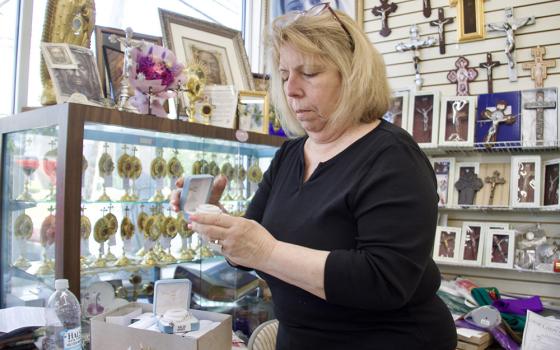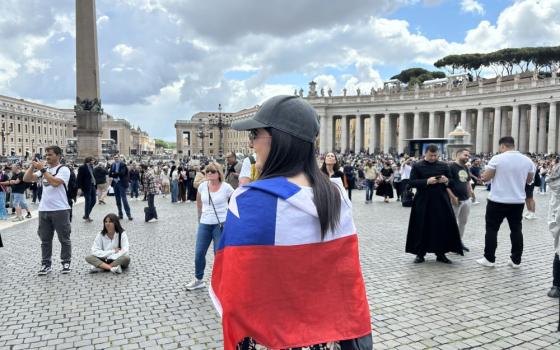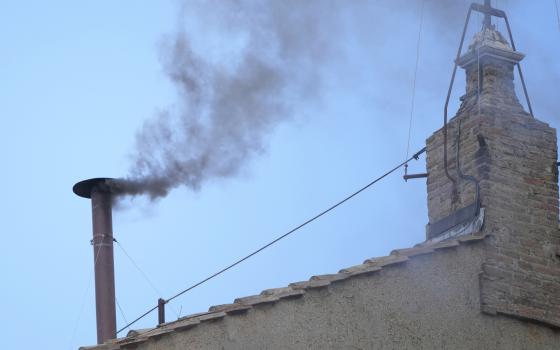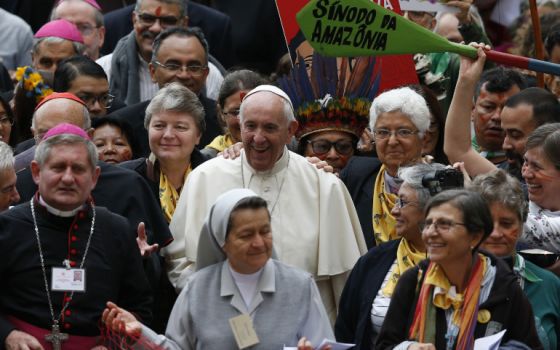A Vatican firefighter helps install a chimney on the roof of the Sistine Chapel at the Vatican May 2. The chimney is connected to a stove in the chapel where the ballots will be burned during the conclave to elect a new pope. Smoke through the chimney will signal to the world whether a new pope has been elected. (CNS/Lola Gomez)
Billboards throughout the Eternal City continue to display images of the late Pope Francis with children and the signature wide smile that seemed to be part of his white wardrobe.
Under the images reads, "Rome embraces Pope Francis with love."
Despite the warm embrace from Romans and while Rome observes nine days of mourning for the popular late pope, a few of Francis' detractors inside the College of Cardinals are speaking out.
They might be few, but they are loud. And some analysts think the campaign to derail momentum from the Francis papacy won't work.
The pre-conclave attacks against Pope Francis' papacy from a few cardinals reflect the winds of authoritarianism the world is experiencing, said Anthea Butler, a religious studies professor at the University of Pennsylvania.

Anthea Butler, professor of religious studies at the University of Pennsylvania (Courtesy of Anthea Butler)
"It's not a stretch to see that the same grasping for authoritarianism of nations wouldn't happen the same way at the conclave,” the U.S. religions expert told the National Catholic Reporter.
The attacks have been steady, on and off the record, inside and outside meetings of prelates called general congregations, the gatherings that take place before a conclave.
Italian media, including La Reppublica, reported that an unnamed Canadian priest told some cardinals entering the congregations at the Vatican May 2: "Do not elect a modernist like Bergoglio."
Team Francis has gone to bat for the late pontiff.
Francis appointed 8 of 10 of the cardinals who will vote for his successor when the conclave begins May 7. Supporters of his legacy have used Masses marking the nine days of mourning for the late pope to extol his qualities while also acknowledging his detractors, who seemed to find fault with anything he said.
Cardinal Víctor Manuel Fernández, former prefect of the Dicastery for the Doctrine of the Faith, gives his homily as he celebrates Mass on the sixth day of the "novendiali," nine days of mourning for Pope Francis, at the Altar of the Confession in St. Peter's Basilica at the Vatican May 1. (CNS/Lola Gomez)
As the sixth day of mourning fell on Italy's national Labor Day on May 1, a protege of Francis, Argentine Cardinal Víctor Manuel Fernández, prefect of the Dicastery for the Doctrine of the Faith, said Mass for the pope at the St. Peter's Basilica.
In his Labor Day homily, Fernández cited examples of his mentor's work habits. Francis never took a day off, something that went back to his days in Argentina and continued until the end of his life, the cardinal said.
"He not only worked in the morning with various meetings, audiences, celebrations and gatherings, but also all afternoon," Fernández said. "And it seemed to me really heroic that with the very little strength he had in his last days, he made himself strong enough to visit a prison."
The late pope valued especially the work of the poor, who toiled long hours for little in return, and often mentioned them in his homilies. But "some dishonest people said Pope Francis was defending the lazy, the drones, the delinquent, the idle," Fernandez said.
Earlier in the week, Cardinal Jean-Claude Hollerich, of Luxembourg, in an April 29 homily talked about Pope Francis' desire to listen to others and the late pope wanted his bishops to do the same. Francis believed in the benefits of listening as a way for the church to listen to the Holy Spirit, he said at the church of Santa Maria in Vallicella in Rome, also known as Chiesa Nuova.
Listening produced the synod process that brought together a variety of church and non-church members, sisters, priests, lay people and a few non-Catholics, in the same room as bishops and cardinals in a multi-year gathering that continues, Hollerich said.
Such an event could have ended in division, given the polarization in the world, but it did not, the cardinal said.
"Thank you, Francis. Together, we want to continue your work," Hollerich said.

Billboards throughout Rome, including this one near the Cipro metro station, display images of the late Pope Francis with children and his signature wide smile. (NCR photo/Rhina Guidos)
While there's wide praise, attacks from others can be expected to continue, said Butler, who chairs the religious studies department at Penn.
"There's a reason why some of them were not as powerful during his papacy," Butler said. "I think that we should take these comments as a political power play to wrestle papal power back from the so-called margins to the geographic center of the west," she said.
While a Francis-appointed cardinal criticized him earlier in the week, it would be surprising to have an overwhelming number of them go against his ideas, Butler said.
Still, what path the cardinal electors will choose is unclear.
Italian newspaper LaRepubblica reported increasing interest for Maltese Cardinal Mario Grech, Secretary General of the Synod of Bishops since 2020; Cardinal Pierbattista Pizzaballa, the Latin patriarch of Jerusalem; and U.S. Cardinal Robert Prevost, of the Vatican’s Dicastery for Bishops.
Hungarian Cardinal Peter Erdo, Italian press reported, has not yet been confirmed by the conservative bloc of cardinals as their official proposal for the conclave.
Meanwhile, Cardinal Vinko Puljic, archbishop emeritus of Sarajevo, Bosnia said that he will physically cast his vote for the next pope which takes place in the Sistine Chapel like the rest of the cardinal electors. There had been earlier press reports that, because of his health, he would vote from bed from the Casa Santa Marta, the nearby guesthouse where the pope lived at the Vatican.
"I need help to enter the Sistine Chapel, but I think there is no problem. With help I will enter," the cardinal said before entering the general congregation May 2, Italian press reported.
Advertisement
As the cardinals go into the conclave, Italy will continue to mourn Francis. The popular Giro D'Italia bicycle race announced it will pay homage to the pope by riding through the Vatican in its final stage in early June.
And since the death of Francis on the day after Easter, many Roman stores have posted photos of the pope with the word "Grazie," or "Thank You."
Camillo Barone contributed to this story.
The National Catholic Reporter's Rome Bureau is made possible in part by the generosity of Joan and Bob McGrath.







